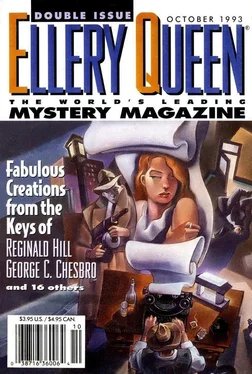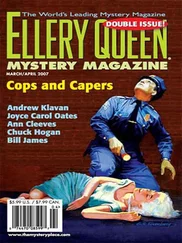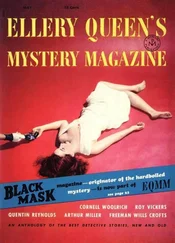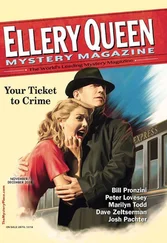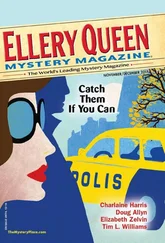Charles Ardai - Ellery Queen’s Mystery Magazine. Vol. 102, No. 4 & 5. Whole No. 618 & 619, October 1993
Здесь есть возможность читать онлайн «Charles Ardai - Ellery Queen’s Mystery Magazine. Vol. 102, No. 4 & 5. Whole No. 618 & 619, October 1993» весь текст электронной книги совершенно бесплатно (целиком полную версию без сокращений). В некоторых случаях можно слушать аудио, скачать через торрент в формате fb2 и присутствует краткое содержание. Город: New York, Год выпуска: 1993, Издательство: Davis Publications, Жанр: Детектив, на английском языке. Описание произведения, (предисловие) а так же отзывы посетителей доступны на портале библиотеки ЛибКат.
- Название:Ellery Queen’s Mystery Magazine. Vol. 102, No. 4 & 5. Whole No. 618 & 619, October 1993
- Автор:
- Издательство:Davis Publications
- Жанр:
- Год:1993
- Город:New York
- ISBN:нет данных
- Рейтинг книги:3 / 5. Голосов: 1
-
Избранное:Добавить в избранное
- Отзывы:
-
Ваша оценка:
- 60
- 1
- 2
- 3
- 4
- 5
Ellery Queen’s Mystery Magazine. Vol. 102, No. 4 & 5. Whole No. 618 & 619, October 1993: краткое содержание, описание и аннотация
Предлагаем к чтению аннотацию, описание, краткое содержание или предисловие (зависит от того, что написал сам автор книги «Ellery Queen’s Mystery Magazine. Vol. 102, No. 4 & 5. Whole No. 618 & 619, October 1993»). Если вы не нашли необходимую информацию о книге — напишите в комментариях, мы постараемся отыскать её.
Ellery Queen’s Mystery Magazine. Vol. 102, No. 4 & 5. Whole No. 618 & 619, October 1993 — читать онлайн бесплатно полную книгу (весь текст) целиком
Ниже представлен текст книги, разбитый по страницам. Система сохранения места последней прочитанной страницы, позволяет с удобством читать онлайн бесплатно книгу «Ellery Queen’s Mystery Magazine. Vol. 102, No. 4 & 5. Whole No. 618 & 619, October 1993», без необходимости каждый раз заново искать на чём Вы остановились. Поставьте закладку, и сможете в любой момент перейти на страницу, на которой закончили чтение.
Интервал:
Закладка:
“Let me tell you how his mind works,” said Dorothy. “He could have sent someone else, but he asked for me. I know why. Six months ago a guy with an Uzi blew out the window of a car three inches from my head. Psychiatric counseling notwithstanding, it was a long time before I could stop shaking when I thought how easily it could have been my skull shattering into a thousand pieces. I’ve been there and I know how it feels, so if you want to get drunk, jump up and down and scream, or chew up the bedclothes, you go right ahead. It will be between you and me.”
Helga looked at Dorothy’s slim, tapering fingers and then at her own, much blunter and shorter. “He seems to have a lot of authority.”
“He does. He’s the head honcho for this district. You’re lucky. He happened to be in the vicinity when he heard the call and stopped in. Ordinarily, he’d let Maguire and Polanski handle it, but something stirred him to take over.” She smiled. “Maybe you caught his eye.”
“Hardly likely,” said Helga drily. “I’ve never been an eye-catcher. He couldn’t even remember my name.”
“He doesn’t remember anyone’s, including the commissioner’s. He calls me everything from Dolly to Dawnie. Before his wife died, we’d hear him mutter about calling Jenny or June or Janet. Her name was Jane.”
They both laughed.
“None of us mind. We wait to see what variation he’ll come up with next. That’s about the only fault he has. You may not have noticed, but with a haircut and a suit that fits, he’d be a good-looking man.”
Helga didn’t tell her she’d noticed.
“Absolutely nothing,” said Polanski. “Even with long-range radar for eyes, she couldn’t have seen anything, and the bank says the branch is squeaky clean. Buford may be sexy, but she’s hell on wheels at her job.”
Roth had seen someone pass his office door. His mouth tightened. “I thought I’d given orders to keep Mola out of here.”
“Hard to do. He’s a reporter—”
“He’s a worthless piece of scum. So’s his editor. Dammit—”
He broke off, eyes narrowing. Mola. Three days ago, a man had been found shot in the head, slumped over the wheel of his car in the short-term parking garage at the airport. The attendant, a retiree working part-time for minimum wage, remembered checking out an air force major at just about the time the M.E. had fixed for the time of death.
Made sense. The man would have allowed the major to walk up to him in the deserted garage without giving it a second thought. Service people were supposed to shoot your country’s enemies, not you.
Made even more sense when the retiree swore one of the major’s chest decorations showed the green, brown, and white of an ETO campaign ribbon, something he was very familiar with since he’d earned one himself. Except the major would have been born after World War II and certainly never fought in that theater.
But given the bad light and elderly eyes, the retiree might have been mistaken. Until Roth found that no officer of that rank or description could be placed anywhere near the airport at that time on that day. Not active, in the reserve, or in the National Guard.
Okay, the uniform had to come from somewhere, but no theatrical or uniform supplier had a record of selling or renting one recently.
Mola, the reporter, had found out about the attendant. He’d agreed to keep his mouth shut, but the next day his newspaper carried a story headlined BOGUS AIR FORCE OFFICER SOUGHT IN AIRPORT SLAYING, and naming the retiree as the witness. The moment Roth heard, he’d sent a car to the retiree’s house. Dead. Same gun used in the parking garage. The killer must have picked up a very early edition.
Testimony to the power of the press.
“Could be,” Roth muttered to himself.
He called Helga and asked if she’d seen an air force officer in the last two days.
She said she hadn’t seen an air force officer in the last two years.
“Are you sure?”
“Of course I’m sure! I know an air force uniform when I see one!”
He took the phone from his ear and stared at it. Feisty when her common sense was challenged.
Still, the ribbon and the young neck were anomalies that had to connect. Had to be the same man.
“Second time around,” said Polanski as he pushed open the door of the small costume shop. “Doesn’t he think we did it right the first?”
“If he did, we wouldn’t be here,” said Maguire.
The clerk was eighteen or nineteen, short and round, a pad of brown hair sitting on the top of his otherwise shaved skull. He looked up from a loose-leaf notebook on the counter.
“Back again! I told you yesterday, we don’t carry military uniforms, so we couldn’t have rented one.”
Maguire laced his fingers and propped an elbow on the counter. “Doesn’t look as though you rent much of anything.”
“I haven’t been here long enough to judge. I’m just a dumb kid working my way through college. As long as I get my check at the end of the week, I’d be happy if no one came in at all. Gives me more study time.”
“You do have blue uniforms, though,” said Polanski. “Maybe something that could pass as an air force uniform.”
“Well...” The clerk rubbed his jaw. “They’re sort of like bus driver’s or security guard’s but you could decorate one up.” He slid open a drawer behind the counter. “Have almost anything you want in here. Want to be a general?” He held up a pair of silver stars clipped to a card. “You couldn’t get into the Pentagon, but it’s just a costume, right?”
“Okay,” said Maguire. “See if you rented one of those.”
“I don’t have to look. I know I didn’t.”
“Humor me. Go check them out.”
The clerk disappeared through a door at the rear of the shop. He returned wearing a frown.
“Something missing?” asked Maguire.
“Not missing. Out of place. Like to keep everything in order, so when I started here I arranged all the costumes according to size. The forty-four was moved into the thirties.”
“If you didn’t move it, who did?”
“Could have been Mr. Kendrick. He owns the shop but he only comes in three or four times a week to see how things are going. Tell you the truth, I don’t think this place makes a dime. I think he runs it as a tax write-off.”
“What size does he wear?”
The clerk scrubbed his jaw again. “I’d say a forty-four.”
Polanski pushed a pad at him. “His address.”
When knuckles tapped at the door, Dorothy motioned to Helga to stay where she was. Holding her pistol straight down at her side, she made sure the security chain was fastened and unlatched the door with her other hand.
It burst open with a crash, tearing the chain anchor from the jamb and knocking her off her feet, the pistol skittering across the rug toward Helga.
The capped, gray-haired man leaped through the doorway, pistol thrust before him with both hands. Surprise at seeing Helga across the room, rather than sprawled behind the door, froze him for a moment. His eyes flicked to Dorothy, now perched warily on hands and toes like a sprinter poised for the starter’s signal.
To Helga, he seemed to read the situation and settle down, swinging the silenced pistol toward Dorothy as the more dangerous of the two.
She dove from the sofa, scooped up Dorothy’s pistol and fired.
The man jerked backward into the hall, his gun coughing and chipping plaster from the ceiling.
Someone shouted. Footsteps pounded up the carpeted stairs.
Roth appeared, gun in hand, jammed a shoe down on the man’s wrist, and tore the pistol from him.
Someone, she didn’t know who, or much care, wrapped Helga up in big arms just as she started screaming she’d shot Allan.
Читать дальшеИнтервал:
Закладка:
Похожие книги на «Ellery Queen’s Mystery Magazine. Vol. 102, No. 4 & 5. Whole No. 618 & 619, October 1993»
Представляем Вашему вниманию похожие книги на «Ellery Queen’s Mystery Magazine. Vol. 102, No. 4 & 5. Whole No. 618 & 619, October 1993» списком для выбора. Мы отобрали схожую по названию и смыслу литературу в надежде предоставить читателям больше вариантов отыскать новые, интересные, ещё непрочитанные произведения.
Обсуждение, отзывы о книге «Ellery Queen’s Mystery Magazine. Vol. 102, No. 4 & 5. Whole No. 618 & 619, October 1993» и просто собственные мнения читателей. Оставьте ваши комментарии, напишите, что Вы думаете о произведении, его смысле или главных героях. Укажите что конкретно понравилось, а что нет, и почему Вы так считаете.
